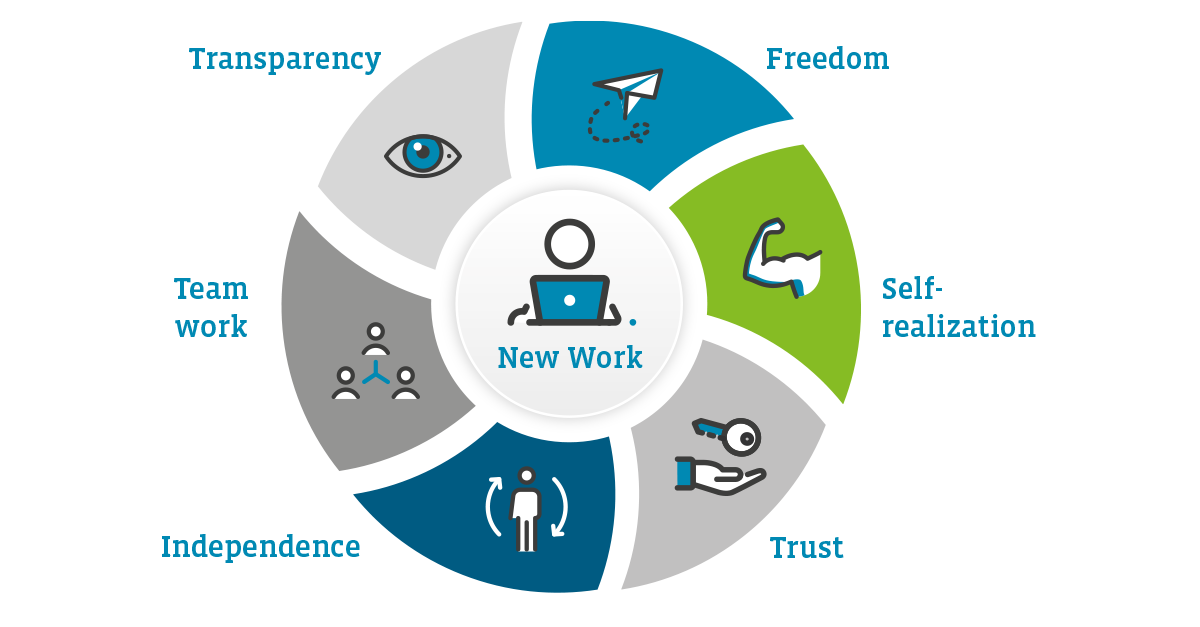Home office, flexible working hours, flat hierarchies – new tools alone are not enough for New Work. Companies must ensure that the continuously changing needs of employees are consistent with the organization to ensure long-term success. This also requires new values and work methods in all areas. The required cultural transformation can be achieved with the right approaches.
Before the COVID-19 pandemic, Sebastian spent five days a week at the office – driving 60 minutes from door to door. During the pandemic, he got used to - and learned to appreciate - the home office: sleeping longer in the morning, helping the kids with homework, doing laundry while on a break, and focused work in the evening. Sebastian likes this type of flexibility.
Soon, he is supposed to return to the office full-time. And he is seriously considering an offer from another company, which - although located in a city further away - would only require him to travel to the head office twice a month. He is thinking about it ...
Employees increasingly demand more flexibility
This example is not an isolated case. The world of work is undergoing a massive change at the moment, and the same applies to the expectations and needs of employees. Many want to continue to design their daily work routines on their own. Therefore the company's culture plays an increasingly important role when it comes to choosing employers.
And it is not just about how many days employees have to be in the office, but also how much the company trusts its employees to complete their tasks without permanent supervision. It means that companies that want to be on the winning side in the war for talent must familiarize themselves with the values and principles of New Work and must establish them in their organization. In this way, they can increase their attractiveness for talent while also achieving cost savings.
What exactly is New Work?
New what? Currently, different terminology exists to describe the concept of New Work, and a variety of definitions are used. Originally (as far back as the 1980s), philosopher Frithjof Bergmann described New Work as a new understanding of work in the era of globalization and digitization. His theory is dominated by the values freedom, independence, purpose, development and social responsibility.
But today, discussions surrounding New Work are often reduced to height-adjustable desks, mobile devices, collaboration tools or working hour models. While these aspects are undoubtedly important, they do not represent the entirety of the New Work concept.
New Work is a new understanding of work, which moves the changing needs of employees into the focus of the organization, and which harmonizes the needs of the customers and the company. The underlying principles must be anchored in all areas of the organization. Only then can the value of New Work be realized in the long term. This includes the company's culture (the foundation), which is shaped by people but also by the processes, structures and work methods in an organization.
In combination with the values postulated by Frithjof Bergmann, the following principles can be derived from this understanding.

Employees have the greatest possible freedom and flexibility when it comes to designing their individual work routines and work schedules. This increases productivity and prevents sick days.
People who believe that their work has meaning and that they are able to realize and continue to develop their potential are intrinsically motivated to do the best job possible. The benefit for the company is higher effectiveness.
Freedom means that companies must trust their employees to make good decisions in the interest of the organization, and that they will ask for help if needed. This is what intrinsically motivated employees do. And it does away with unnecessary coordination and approval procedures, which in turn saves time and costs.
For employees, greater freedom and more decision-making leeway goes hand in hand with increased independence. Employees have more rights, but also the obligation to stand behind their decisions. Accordingly, controlling and management processes can be reduced - while innovation capacity increases.
Independence does not mean leaving employees to fend for themselves. In the digital and hybrid world, good team cohesion is more important than ever. This means: pursuing common goals, agreeing on clear collaboration rules and making sure that no one is excluded. This minimizes human errors and increases the adaptability to new requirements.
Team work does not work without transparent collaboration. At the same time, the general ability to view documents and agile work methods require trust as well as a positive error and feedback culture in the team. When this culture is practiced correctly, much time can be saved as misunderstandings are identified sooner.
These six principles decide how attractive an organization will be perceived by employees, and how efficiently it functions. The good news is that they can largely be controlled by the company.
The path to New Work
The primary objective during the implementation of New Work should be to align the company's culture in such a way that the six principles are established in the minds of all employees and in the company's structures. Four key dimensions must be examined in this respect:
A company culture characterized by values is demonstrated by how employees collaborate, how managers lead their teams or how information is communicated. This requires, for example, creating an environment for hybrid collaboration, coaching managers in “Digital Leadership” and developing “Employee Centricity” models.
Companies should anchor the new culture in their structures and processes. Measures include the integration of New Work principles into classic HR processes, or the digitization of paper-based processes. In addition, they must create a virtual meeting culture that all employees perceive as adding value.
Office premises should be designed in such a way that they can be used intuitively and efficiently by employees. Digital assistant systems can offer support if required. They include AI-based assistants for intelligent room management, as well as collaboration tools and the required IT infrastructure.
The path towards New Work represents a tremendous organizational and cultural change for all companies and their employees. It requires comprehensive project and change management. Here, it is important to meet people at their current position in their personal transformation.
Possible hurdles
When the work results disappoint, many companies still resort to finding the “error” in their employees. But usually, the error can be found in the processes, objectives, leadership patterns or responsibilities. When it comes to New Work, the exact objective is not clear - hence the recommendation of agile processes with continuous testing and learning. Here, all participating employees must be actively involved in the specific design process as early as possible. Because who knows the needs of employees better than they do?
At the same time, possible challenges and solutions, strengths and weaknesses, as well as successes and set-backs must also be identified. This requires a modern error culture that must be practiced and strengthened by the managers. To this end, management directives must focus on flat hierarchies, a purposeful model function and direct collaboration between manager and employees.
Moreover, New Work must be examined from all perspectives and company dimensions. For example, the company's history or cultural and demographic particularities must also be taken into account, so that the appropriate New Work components can be identified. The mere introduction of digital tools and new technologies is not enough in this context. They only support New Work when mindsets, organizational structures and work methods also change.
Tips for the transformation
Every cultural change starts with the definition of a general strategy and vision – also in the case of New Work. This vision, which balances the viewpoints of employees and the company, must be clearly communicated and all measures must be aligned to the vision.
The viewpoints of all those affected must be included in the development and design of the New Work strategy and vision, and they must be openly supported by the highest management levels. This backing from the top reduces the risk of too many parallel initiatives, or the risk that projects miss the mark or are paralyzed due to unclear responsibilities and long decision-making processes.
Managers play a key role in the transformation. They should be motivated to rethink the collaboration culture in their teams. Each team must define for itself how it can and wants to achieve effective digital and hybrid collaboration in the long term. At the same time, clear guidelines with concrete rules and values must be developed, so that everyone is on the same page and the New Work principles are actually implemented.
An important aspect for the realignment of processes and structures is that they must remain flexible and adaptable. Because needs, requirements and solutions are constantly changing.


